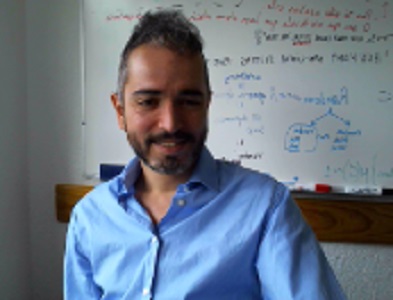Biographical information:
Aldo studied telecommunications engineering and then philosophy at the University of Barcelona. He holds a PhD in Philosophy, supervised by Carl Hoefer and examined by Michael Strevens (NYU), Stephen Mumford (University of Durham), and Daniel Quesada (UAB). During his PhD, Aldo spent time at the Rotman Institute of Philosophy of Science in Canada and the 'Causation in Science' project in Norway. Subsequently he was awarded a postdoctoral fellowship at the Instituto de Investigaciones Filosóficas at UNAM, in Mexico.
Research areas:
Philosophy of physics (esp. statistical mechanics); metaphysics; philosophy of probability.
In considering certain philosophical and scientific arguments we are ignorant of some relevant information. Classic examples of this can be found in metaphysics and the philosophy of physics. For instance, consider the ways the world could have been: we completely ignore the probability, if any, that this or any other world obtained. It turns out that how we represent our epistemic state of ignorance bears on the soundness of these arguments. Aldo’s current research project consists in the assessment of arguments of this sort found in the philosophy of science, in the light of recent models in formal epistemology pertaining to the representation of ignorance.
More details of his research can be found at: https://philpapers.org/profile/28692
and even more at: https://unam.academia.edu/AldoFilomeno
Publications:
Stable regularities without governing laws?
Studies in History and Philosophy of Modern Physics (forthcoming)
Can stable regularities be explained without appealing to governing laws or any other modal notion? In this paper, I consider what I will call a ‘Humean system’—a generic dynamical system without guiding laws—and assess whether it could display stable regularities. First, I present what can be interpreted as an account of the rise of stable regularities, following from Strevens [2003], which has been applied to explain the patterns of complex systems (such as those from meteorology and statistical mechanics). Second, since this account presupposes that the underlying dynamics displays deterministic chaos, I assess whether it can be adapted to cases where the underlying dynamics is not chaotic but truly random—that is, cases where there is no dynamics guiding the time evolution of the system. If this is so, the resulting stable, apparently non-accidental regularities are the fruit of what can be called statistical necessity rather than of a primitive physical necessity.
Fundamentality, Effectiveness, and Objectivity of Gauge Symmetries.
International Studies in the Philosophy of Science. Vol. 30, Issue 1, pp. 19–37. http://dx.doi.org/10.1080/02698595.2016.1240459
It is not clear (to me at least) whether certain metaphysical questions really demand explanation or not. Some philosophers have argued for instance that certain issues related with Laws of Nature do not demand explanation. In this article, though, I propose an argument for why fundamental laws of nature (of a form similar to those of the current Standard Model) would welcome an explanation. The argument relies on Curie's first principle and on a feature of the current laws of particle physics. I also argue that this feature allows us to understand the ``unreasonable'' effectiveness of mathematics in physics (5.2) and to demistify any objectivity of these laws vindicated by ontic structural realists (5.3).
Abstract in a Presentist World
Metaphysica. Vol 7, Issue 2, pp.177–193. https://doi.org/10.1515/mp-2016-0014
Do abstract entities (such as numbers) exist? And do past and future things exist, or only that which is present? These two questions belong to two venerable areas that have been explored rather independently in metaphysics. In this paper I explore how to accommodate abstract entities in a presentist world. I consider both the orthodox metaontological approach of unrestricted fundamental quantification and then ontological pluralism. Under the former we need to impose two constraints in the characterization of presentism in order to avoid undesired commitments to abstract entities: we have to characterize presentism as a thesis only about the concrete and avoid the widely held distinction between tensed and tenseless senses of existence. Under ontological pluralism, instead, we can naturally accommodate any view of abstract objects in a presentist world.
Review of Michael Strevens' "Bigger than chaos. Understanding complexity through probability", HUP, 2003. [In italian]
'Aphex. Giornale italiano di Filosofia analitica', 10. http://www.aphex.it/index.php?Letture=557D0301220174032107010B77052771

